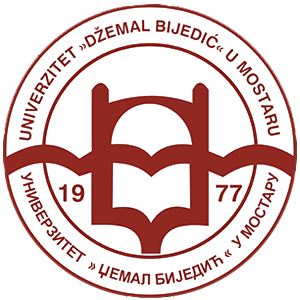Dzemal Bijedic University of Mostar (UNMO)
Herzegovina, and especially the city of Mostar have always been recognized as one of the most important participants in scientific activities in Bosnia and Herzegovina. Still, development of modern higher education in Mostar started in the year of 1950, when a two-year Teacher Training College was established. In the year of 1959, a postsecondary Technical School of Mechanical Engineering was founded, and in 1960 a postsecondary Agricultural School. Branch departments of Law Faculty of Sarajevo and the Faculty of Economy of Sarajevo were formed in Mostar in 1970, and they grew into independent faculties in 1976.
Dzemal Bijedic University of Mostar is an integrated, accredited higher-education institution consisting of the eight members: Agromediterranean Faculty, Faculty of Economy, Faculty of Humanities, Faculty of Information Technologies, Faculty of Civil Engineering, Faculty of Mechanical Engineering, Faculty of Education and Faculty of Law. The University currently ca. 5,000 students, enrolled in 26 study programs of the 1st cycle, 20 study programs of the 2nd cycle and thee study programs of the 3rd cycle. More than 200 full-time professors, assistants and office workers are active in the teaching process, ca. 150 expert associates.
What needs to be emphasized is the fact that not only donors, but the University itself also invested in the infrastructure. University own financial investment totaled over 10 million KM. More than 12,000 m2 of new space has been constructed, so today capacities of the most of the faculties meet the standards for each type of premises: amphitheaters, classrooms and laboratories, including space needed for work of teachers. Construction of a new, modern student dormitory located within the University campus is underway. Mission of Dzemal Bijedic of Mostar is to organize a wide spectar of educational processes of various content and levels, to perform theoretical, applied and developmental research and become one of the leaders in education of young experts needed for development of economy and the society in the University catchment area, but also in a wider context of cultural and social development of the region and the state.
The University achieves its mission by continuous education of the university staff members, ongoing improvement of the educational process and the quality of management and leadership.


